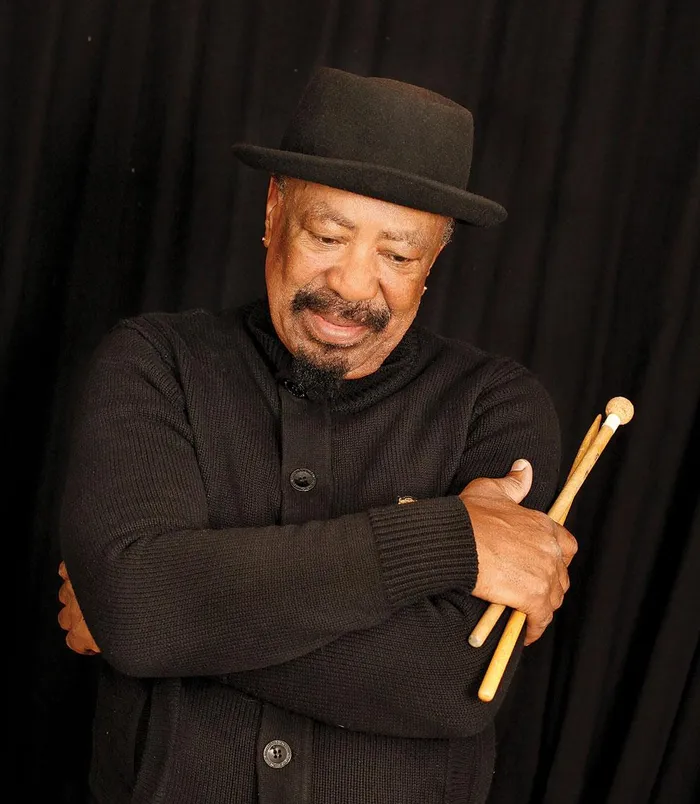The Legacy of Louis Teboho Moholo: A journey through South Africa’s free jazz

The great Louis Moholo passed away on June 13, 2025.
Image: Supplied
In one of the most personal and powerful accounts of Louis Teboho “Bra Tebs” Moholo, titled “Remembering the Blue Notes: South Africa’s First Generation of Free Jazz” by Gwen Ansell, the author shares a quote that encapsulates the deep frustration which drove the mass exodus of some of South Africa’s finest artists. It also conveys the stifling, oppressive environment experienced by them—and other people regarded as non-white—in apartheid South Africa.
“We were all kind of rebels,” drummer Louis Teboho Moholo-Moholo recalls, “so, like birds of a feather, [we] flocked together.”
Birds do not walk away—they fly. And so it was with the Blue Notes: a group of rebels and radicals—literally, figuratively, and artistically. They flew to places where they could be themselves: artists, creatives, free spirits.
They took with them “ideas from the Xhosa music—complex rhythms; overtone singing; the oscillating harmonics of stretched bowstrings; a heterophony of voices, each cycling through its own sequence of notes and beats—that have infused Eastern Cape jazz, from the work of pioneering bandleaders such as Christopher Columbus Ngcukana in the 1950s right through to current players such as Andile Yenana and Feya Faku,” as Ansell writes.
One could add that they also carried with them the rich and vibrant urban township (elokishini) sound of the Merry Macs, and the lasting influence of big band leaders like Joel “Mbrooks” Mlomo, of whom Langa had several. As he left these shores, Teboho carried the haunting resonance of Tem Hawker’s Harmony Kings Band with him—Bra Tem is a story all on his own.
Bra Tebs, ever the seeker of the holy grail of music, was once part of Langa’s flourishing jazz scene. This included groups like the Hay Marketers, Zum Bum Rhythm, Rhythm Jugglers, and the Sentimental Monarchs, among others. He awoke to the sounds of De Bafana Band and the Hip Cats Trio—Joe Oliphant, Christopher Columbus Ngcukana, and Tem Hawker.
He often spoke of the great Moses Molelekwa, the multi-instrumentalist he described as “that cat with another sound”. He was lulled to sleep—and disturbed in his sleep—by the Dlova brothers: Danayi on piano, and Woodrow “Bra Wood” Dlova on trumpet, whose searing tone shaped the soundscape of Langa. As Kwezi Kobus and Carla Lottering have written in more detail, these musicians left a permanent imprint.
Teboho also internalised the pain of the forced removals from Ndabeni/Uitvlugt (modern-day Pinelands and Epping), weaving it into his rhythms: the amagwijo of young men going to the mountain; the humming, throat-deep mbolorho of migrant workers singing of green mountains, lush fields of home, and the backbreaking mule work in the city.
Such a vibrant community, and a rich family environment, inevitably left a mark on Teboho and shaped his approach to music. He brought this essence into the Blue Notes—a sound that was free yet disciplined, rough yet soothing to the soul. It bypassed the ear and struck straight at the heart.
This was a sound that could not be contained. It was too cheeky, too insubordinate, too bold—everything the apartheid government did not want a Bantu to be. This was Louis’s sound. It was the sound that, according to jazz photographer Valerie Wilmer (as quoted by Gwen Ansell), “literally upturned the London jazz scene, helping to create an exciting climate in which other young players could develop their own ideas about musical freedom”.
The rebels left. But with them, they took the soul of this country.
The staid British jazz scene was hit by a hurricane of sound—defiant, joyful, difficult to categorise. In every venue they played, it reverberated with echoes of umqhashiyo, kwela, mbaqanga, sorrowful hymns of Mothers’ Union gatherings, tears for those left behind, longing for home, lost love, broken hearts and homes.
All these came through in Bra Tebs’ performances—alongside jazz greats like Archie Shepp, Cecil Taylor, Keith Tippett, Evan Parker, and Jon Surman. These musicians consistently hailed the Blue Notes as pioneers, innovators whose influence revitalised the dwindling jazz scene in Europe at the time.
One witnessed this first-hand at venues like Ronnie Scott’s or the Vortex in Islington. As Louis walked in, the musicians on stage would nod respectfully mid-performance; he would wave back, and the patrons would flock to his table. He’d speak to them as though they were old friends—no airs, no pretence.
Just Teboho, the outie from Langa. Eskom—as Langa is affectionately known.
Thank you to all those who contributed additional information.
* This is a piece written by Geoff Mamputa on the passing of his friend, Louis Moholo, the great jazz musician and drummer.
Cape Argus
Related Topics: